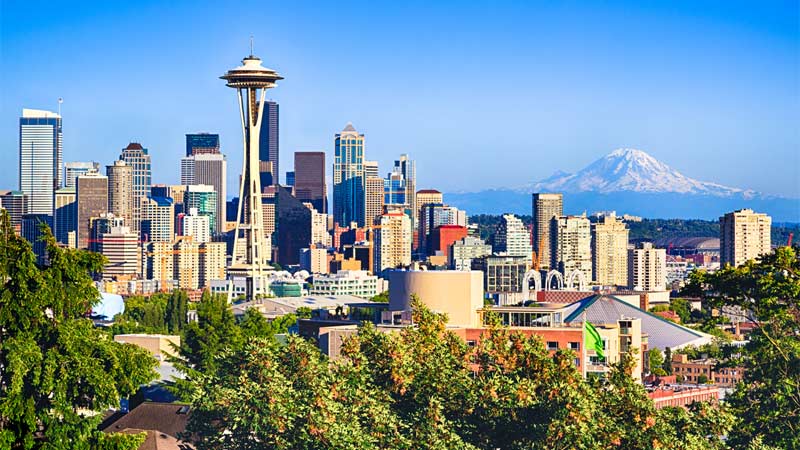Best Cities for Startups – Seattle
Seattle is perhaps just as well known for its tech startups as for its coffee and grunge music scene. In fact, it’s the ninth-best city in the world for startups, according to Startup Genome. Not only are the city and surrounding area home to a host of tech giants like Microsoft, Amazon, Google, Facebook, Twitter, and eBay, but there are plenty of rising stars as well, including Zillow, Tableau, INRIX, PicMonkey, and Moz. Former employees of some of these companies started their own tech firms, such as Expedia, using the valuable experience they acquired. “Together with spinoffs from the University of Washington, this record has given the region a rich genealogy of startups that became scaleups, begetting more scaleups,” Startup Genome says.

Of particular interest to entrepreneurs: Seattle boasts $1.5 billion in early-stage funding (global average $431 million) and has an ecosystem value of $30 (global average $10.6 billion).
Beyond the numbers, Startup Genome rates Seattle in the top 10 cities worldwide regarding global ecosystem performance and in the top 15 for global ecosystem talent.
“One thing that’s really unique about Seattle is that major tech companies like Boeing, Amazon, and Microsoft started here decades ago, and they’ve been hiring engineers since the 1970s or earlier,” says Brett Greene, CEO and founder of New Tech Northwest. These companies have spawned dozens of startups and serve as customers and clients for plenty of others. “Just having that enterprise base with Boeing, Amazon, and Microsoft has made this huge ecosystem,” Greene says.
Inc also notes that Seattle’s population grew by 25% between 2010 and 2020. That has brought with it a huge influx of talent – so much so that Microsoft and Amazon employ more than 50,000 people each in the Seattle area.
Artificial intelligence (AI), big data and analytics, and the life sciences are particular bright spots. From Google’s investment of $10.5 million in AI marketplace Algorithmia, to Apple’s expansion of its AI efforts, to the success of startups like Icertis, AI-focused companies are investing big in Seattle. The life scientists get a big boost from the University of Washington’s highly regarded primary care and family medicine programs, as well as from biotech companies like ZymoGenetics and major investors like the Bill & Melinda Gates Foundation. According to Startup Genome, Silverback Therapeutics raised $78.5 million in 2020, while Impel NeuroPharma raised $67.5 million in 2018.
It’s probably obvious by now that Seattle is great for startups. But in case you’re curious, here are some additional reasons to consider the city for your next venture.
There’s Plenty of Venture Capital
Inc points out that in some ways, the COVID-19 pandemic benefitted Seattle’s tech startups because people were forced to rely on technology more than they ever had. "Seattle has a higher proportion of tech workers than almost anywhere else in the country, and that has helped the city to be more resilient," Tim Porter, managing partner at Seattle-based Madrona Venture Group, told Inc.com. "From a tech perspective, it was a very strong year here." The Puget Sound Business Journal reports that venture capitalists invested some $3.2 billion in Seattle startups generally during the first three quarters of 2020. Many of these companies are in sectors such as healthcare, AI, and gaming, all of which are expected to continue to do well.
For example, Inc.com says that telemedicine platform 98Point6, which lets patients text chat live with their doctors, grew from 350,000 users to 3 million. Flowplay, a mobile gaming company, capitalized on people’s need for more entertainment during lockdown by launching a service that allows customers to play casino games and interact with other players.
Entrepreneurs Get Lots of Support
The University of Washington, Seattle Pacific, and Seattle University all offer entrepreneurship programs and are instrumental in producing tech startups. The University of Washington, which produces more than 600 graduate software engineers every year, also provides a host of other startup resources. For its part, Seattle University’s Innovation and Entrepreneurship Center offers grants, mentors, networking, and aid to underserved businesses in the city.
Outside the university setting, accelerators and incubators like Techstars Seattle, New Tech Northwest, and 9Mile Labs provide mentorship programs, networking opportunities, workshops, funding, and other assistance to entrepreneurs. Angel investors are prevalent as well, including through organizations like the Seattle Angel Conference.
The city itself also offers startup resources courtesy of its Office of Economic Development. These include, among other things, an ever-expanding list of organizations and services for tech startups; data and insights about the local startup landscape; and efforts to measure and promote the impact of tech startups on the local economy, foster startup communications, improve diversity and inclusion in the tech sector, and expand employment opportunities.
Moreover, Seattle is a relatively collaborative place in general. “It’s a dolphin tank instead of a shark tank,” Greene says. “There are some sharks in it, but overall people tend to help each other out as long as they don’t think it will hurt their own company.” This cooperative spirit has a fringe benefit: If someone’s startup fails, they might be able to go to work for someone else with whom they have developed a relationship. “That kind of attitude has really helped Seattle to grow,” he says.
Seattle Is a very Livable City
Microsoft runs its own accelerator in Seattle for a number of reasons (in addition to its proximity to the company’s global headquarters). For one, the city is simply a pleasant place to live and work. Its population density is much lower than that of other startup hubs like Silicon Valley and New York City, but there is still a critical mass of talent to support startup growth. A lot of that talent is on the younger side, as people between the ages of 25 and 39 comprise nearly a third of Seattle’s population.
Salaries are also lower than in some other cities (although not by much), as is the cost of living – especially when it comes to housing. And there’s plenty of good commercial real estate, as many businesses have permanently switched to remote work for at least some of their employees, so finding office space for your startup should be relatively easy. Add in the gorgeous scenery, temperate (albeit rainy) weather, and abundant recreational opportunities, and Seattle is hard to beat when it comes to overall quality of life. That’s a boon for both startups and their employees.
A Great Place for Cloud-Based Startups
Thanks in large part to big tech companies like Microsoft and Amazon, several of the world’s largest data centers are based in Washington state in the vicinity of the Columbia River. This provides a key advantage for cloud-based companies of all sizes, including startups. Many of these, including Expedia, Blue Nile, and Zulily, are consumer-focused.
About the Author

An analyst of global affairs, Adriaan has an MSC from Oxford, with diverse interests in the digital economy, entertainment, and business. He is a specialist trainer in advanced analytics and media.
Startup Resources
- Learn more about Startups
- Visit the TRUiC Business Name Generator
- Check out the TRUiC Logo Maker
- Read our Business Formation Services Review
- Find Startup Ideas
- Explore Business Resources
Form Your Startup
Ready to formally establish your startup? Click below to read our review of the best business formation services!
Best Business Formation Services